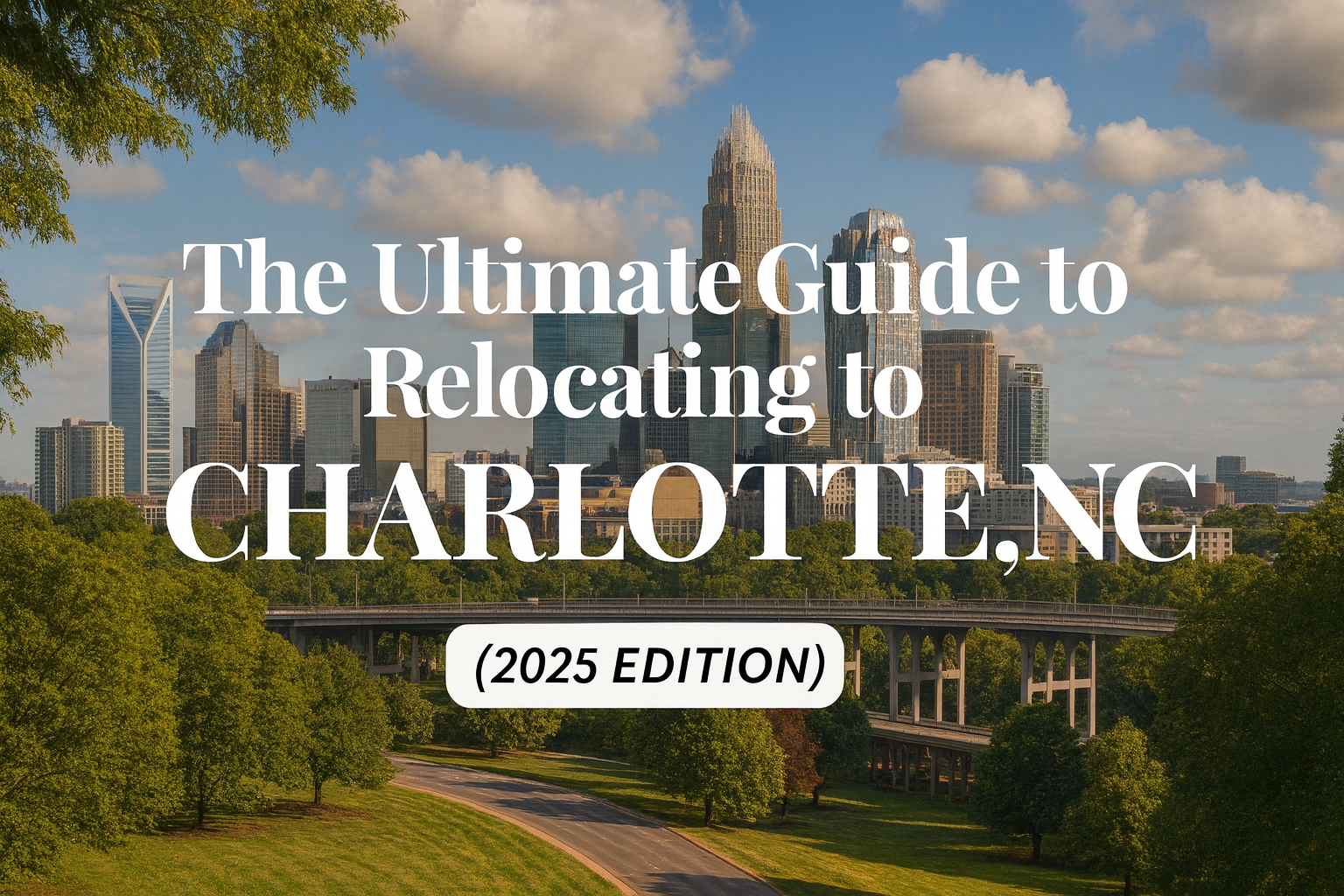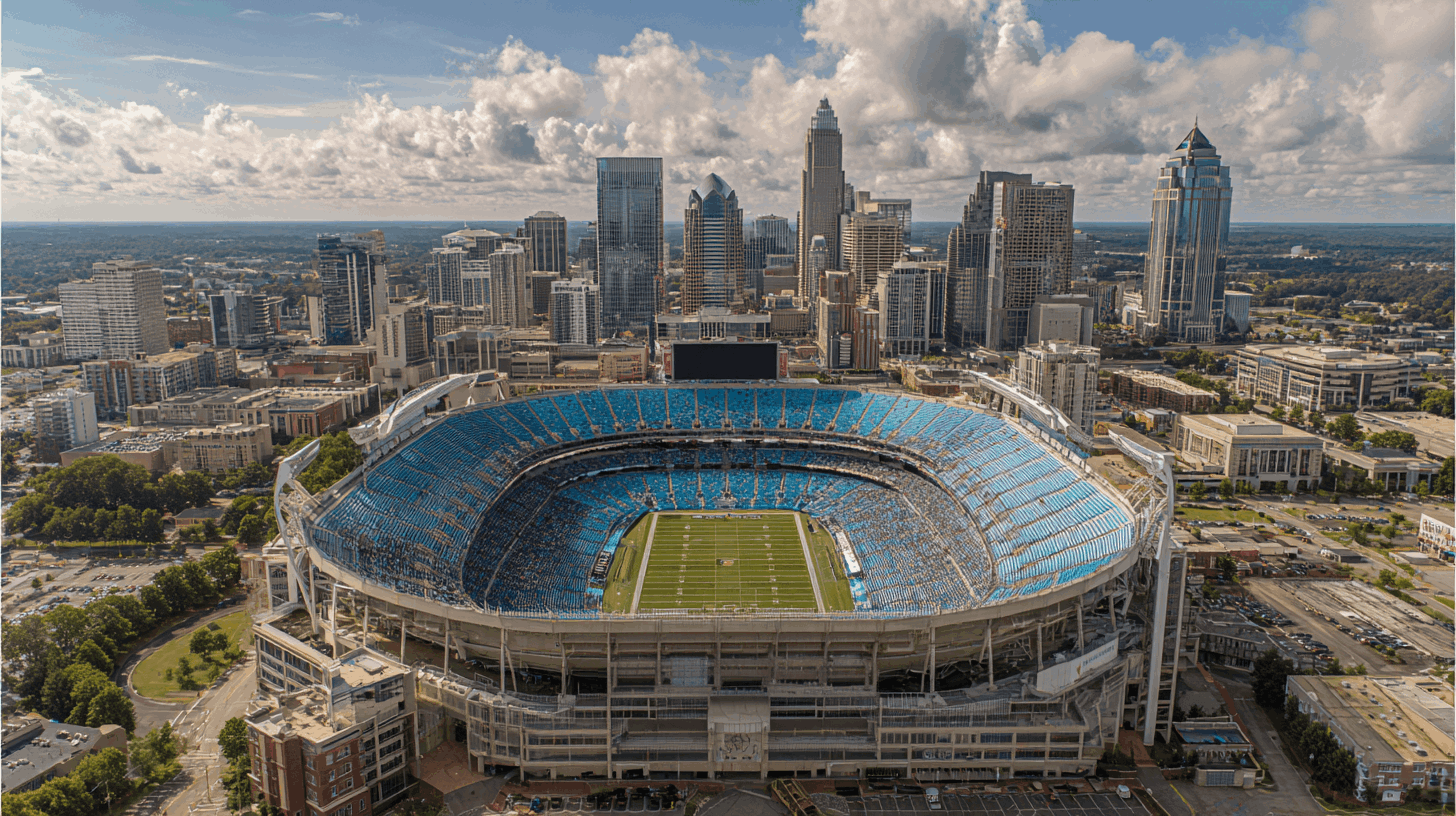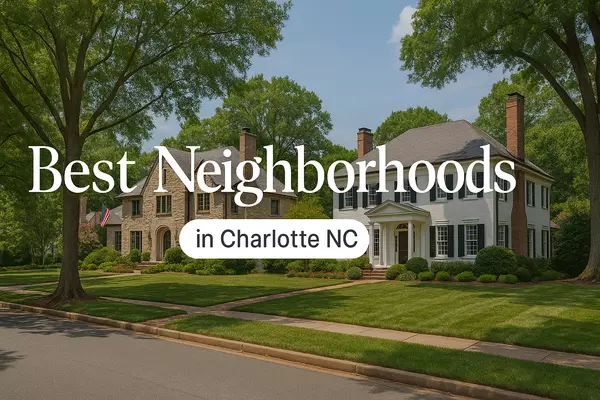The Ultimate Guide to Relocating to Charlotte, NC (2025 Edition)


The Ultimate Guide to Relocating to Charlotte, NC (2025 Edition)
1. Introduction
Thinking about moving to Charlotte, North Carolina? Known as “The Queen City,” Charlotte blends the warmth of Southern hospitality with opportunities of a thriving metropolitan hub. Over the past decade, it has rapidly grown into one of the fastest-growing cities in the United States, attracting residents from across the country and internationally.
This 2025 Charlotte Relocation Guide serves as your insider’s handbook to understanding the city’s unique appeal — from its strong job market and diverse neighborhoods to lifestyle perks, cost of living, and practical moving tips. Whether you’re a young professional, a family searching for quality schools, or a retiree drawn by a mild climate and vibrant cultural offerings, this guide helps you make an informed decision about making Charlotte your home.
2. Why Move to Charlotte, NC?
Charlotte offers a rare combination of:
- Economic opportunity
- Cultural vibrancy
- Outdoor recreation
- Affordable living
These factors make it one of the most desirable relocation destinations in the Southeast in 2025.
Top Reasons to Relocate to Charlotte
- Booming Job Market: Charlotte is the second-largest banking center in the U.S. It hosts major employers across finance, technology, healthcare, and energy, offering opportunities at all career levels.
- Cost of Living Advantage: Housing, groceries, and transportation costs are lower than many major metros like New York, San Francisco, and Washington D.C., enabling residents to enjoy a higher quality of life.
- Prime Location: Charlotte is about two hours from the Blue Ridge Mountains and three hours from Atlantic beaches, making weekend getaways easy and frequent.
- Lifestyle & Recreation: From professional sports and award-winning restaurants to hiking trails, lakes, and year-round golf, Charlotte offers an active and fulfilling lifestyle.
- Community Spirit: Despite rapid growth, the city maintains a friendly, neighborly atmosphere where newcomers feel welcomed and at home quickly.
- Year-Round Climate: Charlotte benefits from four distinct seasons, mild winters, and long springs and falls encouraging outdoor activities.
3. Charlotte Overview: Location, Population & Growth
Location
Charlotte is strategically located in North Carolina’s southwestern region, just north of the South Carolina border. This central Southeastern position puts it approximately:
- 2 hours from the Blue Ridge Mountains (skiing, hiking, scenic weekends)
- 3 to 3.5 hours from Atlantic beaches along North and South Carolina coasts
It is a critical transportation hub served by Interstates I-77, I-85, and I-485, connecting Charlotte to regional metros like Raleigh, Atlanta, and Columbia.
Population
As of 2025:
- City population estimated between 931,000 and 936,000 residents, making it North Carolina’s largest city and the 15th largest in the U.S.
- Metropolitan area population exceeds 2.38 million, reflecting robust growth.
Growth Trends
Charlotte is one of the fastest-growing U.S. metropolitan areas, attracting approximately 100+ new residents per day. This surge is fueled by:
- Expanding job opportunities
- Lower cost of living
- Favorable tax rates
- Pleasant climate
- Quality lifestyle amenities
The city’s business-friendly environment continues to attract corporate relocations and entrepreneurs, with significant investments in housing, infrastructure, and industry growth.
4. Lifestyle & Climate in Charlotte
Four Distinct Seasons
- Spring (Mar–May): Mild temperatures; blooming dogwoods, azaleas, and crepe myrtles; festivals and farmers markets.
- Summer (Jun–Aug): Warm and humid with highs in upper 80s to low 90s; perfect for lake outings, beach trips; afternoon thunderstorms common.
- Fall (Sep–Nov): Crisp mornings, warm afternoons in 70s; vibrant foliage; football games; pumpkin and wine/beer festivals.
- Winter (Dec–Feb): Mild with highs in upper 40s to mid-50s; occasional light snow; many outdoor activities remain open.
Comfortable Outdoor Living
Charlotte’s climate supports year-round golf, hiking, and al fresco dining. Its location between the Blue Ridge Mountains and the Atlantic Coast enables easy weekend outdoor adventures ranging from skiing to beach trips.
Vibrant Cultural & Business Districts
Charlotte’s Uptown business district thrives as a hub for dining, arts, and entertainment. During business hours, professionals work across sectors from banking to healthcare. Evenings and weekends offer theaters, rooftop bars, music venues, and sports arenas that draw locals metro-wide.
Friendly, Community-Driven Atmosphere
Despite population growth and a rising urban skyline, Charlotte retains a warm, small-town Southern charm, evidenced by neighborhood pride, active homeowners associations, volunteer events, and seasonal block parties — fostering a strong sense of community connection.
5. Pros & Cons of Living in Charlotte
Pros
- Affordable Major Metro: Lower cost of living than NYC, SF, and Atlanta — particularly in housing.
- Mild Winters & Vibrant Transitional Seasons: Light snow and long colorful spring/fall seasons.
- Thriving Arts, Dining & Brewery Scenes: Cultural venues and one of the Southeast’s fastest growing craft beer industries.
- Abundant Green Space & Recreation: 230+ parks, scenic greenways, nearby lakes, mountains, and beaches.
- Strong Job Market: Fast-growing metro with diverse employment opportunities.
- Community Spirit: Friendly neighborhoods fostering strong belonging.
Cons
- Hot, Humid Summers: July and August often hit 90s°F with high humidity.
- Traffic Congestion: Key corridors such as I-77 and I-485 can be congested during rush hours.
- Limited Public Transit Coverage: Many outer neighborhoods still rely heavily on cars despite transit improvements.
- Heavy Pollen Season: Spring pollen causes allergies for some residents.
- Rising Housing Prices: Demand narrows affordability in popular areas.
Pro Tip: Choose neighborhoods near light rail or major expressways to minimize traffic impact. Allergy sufferers may want homes with HVAC filtration to reduce pollen exposure.
6. Best Neighborhoods in Charlotte
Charlotte boasts a diverse range of neighborhoods, each with its own distinct atmosphere, home styles, and amenities. Whether you prefer urban excitement, historic charm, family-friendly suburbs, or lakeside living, there’s a perfect fit for your lifestyle here.
Explore our Best Neighborhoods in Charlotte guide for a deep dive into Uptown, Dilworth, Myers Park, Plaza Midwood, SouthPark, and more. Each profile includes key lifestyle features, commute details, school ratings, and current homes for sale, helping you find the right spot as you start your search.
Urban & Trendy
- Uptown Charlotte: High-rises, nightlife, sports venues, for energetic professionals.
- South End: Artsy with craft breweries, murals, Rail Trail; popular among creatives.
- NoDa: Arts & culture hub offering live music, eclectic dining, and nightlife.
- Plaza Midwood: Vintage charm, foodie scene, creative culture.
- Sedgefield: Centrally located near South End, growing home values.
Historic & Established
- Eastover: Prestigious neighborhood known for its stately historic homes, luxury estates, and proximity to top-ranked schools.
- Myers Park: Upscale, tree-lined streets, top-ranked schools.
- Dilworth: Historic charm, walkable, boutique shopping.
- Elizabeth: Walkable, close to Uptown, with green spaces like Independence Park.
Suburban & Family-Friendly
- SouthPark: Upscale shopping, dining, and executive homes.
- Ballantyne: Master-planned community with luxury homes and corporate parks.
- Providence Plantation: Quiet with spacious lots in family-oriented atmosphere.
University Area
- University City: Affordable, diverse, home to UNC Charlotte.
Lake & Outdoor Lifestyle
- Huntersville & Lake Norman: Lakeside living, boating, waterfront dining.
- Mountain Island Lake: Quieter lake access with less traffic.
- Tega Cay & Lake Wylie: Lakeside living, boating, waterfront dining in SC.
Up-and-Coming & Value Picks
- Belmont: Affordable, breweries, skyline views.
- Madison Park: Mid-century charm, affordable prices.
- Montclaire: Mid-century homes, renovated properties, excellent schools, and parks.
7. Neighborhood Selection Guide
| Neighborhood | Walkability | School Quality* | Commute to Uptown | Family Friendly | Key Appeal |
|---|---|---|---|---|---|
| Uptown Charlotte | Very High | Moderate | Walkable | Moderate | Urban core, nightlife, sports |
| South End | Very High | Moderate | 10–15 min | Moderate | Trendy, artsy, breweries |
| NoDa | High | Moderate | 10–15 min | Moderate | Arts, nightlife, creative community |
| Myers Park | Moderate | Excellent | 10–15 min | Excellent | Upscale, historic, family-centered |
| Dilworth | High | Good | 10–15 min | Excellent | Historic charm, walkable |
| Elizabeth | Moderate | Good | 10–15 min | Good | Quaint, historic, green spaces |
| Ballantyne | Low | Excellent | 20–30 min | Excellent | Suburban, luxury, family-friendly |
| Providence Plantation | Low | Excellent | 15–25 min | Excellent | Quiet, spacious, upscale |
| SouthPark | Moderate | Excellent | 10–20 min | Excellent | Luxury homes, shopping, dining |
| University City | Moderate | Good | 20–25 min | Good | Affordable, near campus |
| Plaza Midwood | High | Moderate | 10–15 min | Moderate | Eclectic, foodie scene, creative culture |
| Huntersville | Low | Good | 25–35 min | Excellent | Lakeside lifestyle |
| Lake Norman | Low | Good | 35–45 min | Excellent | Waterfront living |
| Belmont | Moderate | Average | 10–15 min | Good | Affordable, emerging area |
| Sedgefield | Moderate | Average | 10–15 min | Good | Close to South End, growing values |
| Madison Park | Moderate | Average | 15–20 min | Moderate | Mid-century charm, affordable |
| Eastover | Moderate | Excellent | 5–10 min | Excellent | Prestigious, historic, luxury homes |
| Lake Wylie | Low | Good | 30–40 min | Excellent | Waterfront living, relaxed lifestyle |
*School Quality based on public school ratings and neighborhood reputation; subject to change.
8. Cost of Living in Charlotte, NC
Charlotte continues to offer an affordable cost of living relative to many major U.S. metros.
Key Expense Breakdown
- Median Home Price: Approximately $435,000 with variation depending on neighborhood.
- Rental Market: Average rent for a one-bedroom apartment is about $1,900/month, higher in Uptown, South End, and SouthPark.
- Utilities & Groceries: Utilities average $175–$230/month, groceries roughly 1% above U.S. average.
- Transportation: Most households own vehicles; gas prices slightly below national average. Public transit fares are affordable but coverage is limited.
- Property Taxes: Mecklenburg County’s general property tax rate in 2025 is $0.4927 per $100 of assessed value. Properties located within the City of Charlotte also pay a city property tax rate of $0.2741 per $100 of assessed value. The combined tax rate for Charlotte (city + county) totals $0.7572 per $100 of assessed value. Property tax rates in Mecklenburg County and Charlotte remain competitive compared to similar metro areas.
- Income Taxes: North Carolina has a flat income tax rate of 4.5% in 2025.
Overall, Charlotte’s living costs are about 3–5% below the national average, making it attractive for those relocating from higher priced areas.
9. Job Market & Career Opportunities
Charlotte is a dynamic economic hub anchored by diverse, high-growth industries:
Key Growth Sectors
- Finance & Banking: Second-largest U.S. banking center with headquarters for major financial firms.
- Technology: Growing sector including software development, cybersecurity, and data analytics.
- Healthcare: Premier hospital systems and biotech firms with ongoing expansion.
- Energy & Manufacturing: Leading energy producers and manufacturing operations.
Major Employers
- Bank of America
- Wells Fargo
- Lowe’s (headquartered nearby Mooresville)
- Duke Energy
- Honeywell
- Atrium Health
- Novant Health
- Truist Financial Corporation
- Nucor
- Sonic Automotive
- Brighthouse Financial
- LendingTree
- USAA
- Hendrick Motorsports
- NASCAR
Charlotte’s employment opportunities are supported by a skilled workforce, excellent transportation infrastructure including Charlotte Douglas International Airport, and ongoing investments in innovation hubs and workforce programs.
10. Schools & Education
Public Schools
Charlotte-Mecklenburg Schools (CMS) serves over 141,000 students. It emphasizes academic excellence, equity, and innovation, offering:
- Strong STEM and magnet programs
- International Baccalaureate (IB) curricula
- Transportation and lottery-based access
- Comprehensive special education, including autism support
Private & Specialized Schools
Numerous private and faith-based schools provide a range of educational philosophies and religious backgrounds.
Higher Education
- University of North Carolina at Charlotte (UNCC): Largest with ~30,000 students, strong engineering, business, and health sciences programs.
- Davidson College: Prestigious liberal arts college ~20 miles north of Charlotte.
- Queens University of Charlotte: Private liberal arts university focusing on experiential and international learning.
- Winthrop University, Wingate University, Belmont Abbey College, Johnson C. Smith University: Other notable institutions enriching the region’s academic landscape.
11. Transportation in Charlotte
Major Highways & Roadways
- I-77: North-south artery connecting to Lake Norman and southern suburbs.
- I-85: East-west route linking Charlotte to Atlanta and the Research Triangle.
- I-485 ("The Loop"): 67-mile beltway encircling Charlotte’s metro area.
Public Transit Options
- LYNX Blue Line Light Rail: 19.3-mile rail running through Uptown, South End, Pineville, and near Fort Mill, SC, with expansion plans.
- CityLYNX Gold Line Streetcar: Connects Uptown and South End neighborhoods.
- CATS Bus Network: Local and express buses with service improvements.
- Charlotte Gateway Station: Multimodal hub in phased development.
Airport Access
Charlotte Douglas International Airport (CLT) is a major national and international hub, serving over 53 million passengers annually and undergoing terminal upgrades.
Active Transportation & Multimodal Connectivity
- Uptown CycleLink: Separated bike lanes across Charlotte’s Central Business District.
- Charlotte Rail Trail: Multi-use trail connecting South End and Uptown, with expansion projects.
- Electric scooters and bike shares provide last-mile transportation in key neighborhoods.
Funding & Planning Efforts
Charlotte and Mecklenburg County are investing billions in an 18-year plan to modernize infrastructure, expand transit, and enhance sustainable mobility. Legislative support helps secure funding for these initiatives.
12. Arts, Culture, Sports & Dining
Cultural Hubs
- Levine Museum of the New South
- Mint Museum Uptown
- Bechtler Museum of Modern Art
- Blumenthal Performing Arts Center
- Charlotte Ballet
- McColl Center for Art + Innovation
- Harvey B. Gantt Center for African-American Arts + Culture
Sports Teams

- Carolina Panthers (NFL)
- Charlotte Hornets (NBA)
- Charlotte FC (MLS)
- Charlotte Knights (Triple-A Minor League Baseball)
- Charlotte Checkers (AHL Hockey)
Charlotte also hosts the NASCAR Hall of Fame and major PGA events like the Wells Fargo Championship.
Dining Scene
With over 1,400 restaurants, Charlotte offers diverse options from Southern classics to international cuisine. Its craft brewery scene is among the fastest growing in the Southeast, centered in South End, NoDa, and other neighborhoods. Food halls like Optimist Hall and farmers markets contribute to the vibrant local food culture.
13. Outdoor Recreation & Day Trips
- U.S. National Whitewater Center: Whitewater rafting, zip-lining, hiking, biking, rock climbing.
- Crowders Mountain State Park: Hiking, rock climbing, panoramic views about 30 minutes away.
- Lake Norman & Mountain Island Lake: Boating, fishing, water sports, waterfront dining.
- Day Trips: Blue Ridge Mountains (~2 hours), Asheville (~2.5 hours), Wilmington and Atlantic beaches (~3-3.5 hours).
Additional outdoor options include greenways, urban parks, golf courses, and seasonal festivals.
14. Golf Courses
Public Courses
- Renaissance Park Golf Course – Championship caliber design.
- Charles T. Myers Golf Course – Popular beginner course.
- Harry L. Jones Sr. Golf Course – Recently renovated.
- The Golf Club at Ballantyne – Public, resort-style experience.
Private Clubs
- Charlotte Country Club – Historic Donald Ross course.
- Quail Hollow Club – Hosts Wells Fargo Championship.
- Carmel Country Club – Two 18-hole championship courses.
- The Club at Longview – Jack Nicklaus Signature Course.
- Firethorne Country Club – Upscale amenities in Marvin.
- Myers Park Country Club – Classic, in-town club with social calendar.
Semi-Private Hidden Gems
- Pine Island Country Club – Flexible memberships.
- Olde Sycamore Golf Plantation – Scenic layout.
- Raintree Country Club – Two courses near SouthPark and Ballantyne.
15. Moving Tips for Charlotte, NC
- Research and Visit Neighborhoods: Explore urban hubs, family-friendly suburbs, and lakeside communities.
- Understand the Housing Market: Get pre-approved and start early especially for good school districts.
- Prepare Your Budget: Include rent/mortgage, utilities, HOA fees, and commuting costs.
- Connect with Local Resources: Join community groups on Facebook, Nextdoor, and other platforms.
- Partner with a Local Realtor: To find hidden gems and navigate competitive bids.
- Check School Enrollment Deadlines: Especially if you have children.
- Plan Your Move Timing: Avoid peak summer months if possible.
16. Final Thoughts
Charlotte’s unique blend of big-city energy and small-town Southern charm makes it a premier relocation choice. With a booming job market, diverse neighborhoods, strong schools, year-round recreation, and competitive cost of living, Charlotte offers a high quality of life for a wide range of lifestyles.
Whether you are drawn by career opportunities, cultural vibrancy, or proximity to the mountains and beaches, Charlotte lives up to its promise as a place to live, work, and thrive.
If you’re ready to make the move, my team and I are here to guide you every step of the way — from exploring neighborhoods to finding the perfect home. Reach out today, and let’s start making your Charlotte dream a reality.
Frequently Asked Questions About Moving to Charlotte
Is Charlotte affordable to live in?
Yes, Charlotte has an overall cost of living about 3–5% below the national average, with housing costs more affordable than many major U.S. cities.
What is the job market like in Charlotte?
The job market is strong and diverse, with booming sectors in finance, technology, healthcare, energy, and manufacturing providing opportunities at various career levels.
What are winters like in Charlotte?
Winters in Charlotte are generally mild, with highs typically in the upper 40s to mid-50s and occasional light snow events.
Categories
Recent Posts








